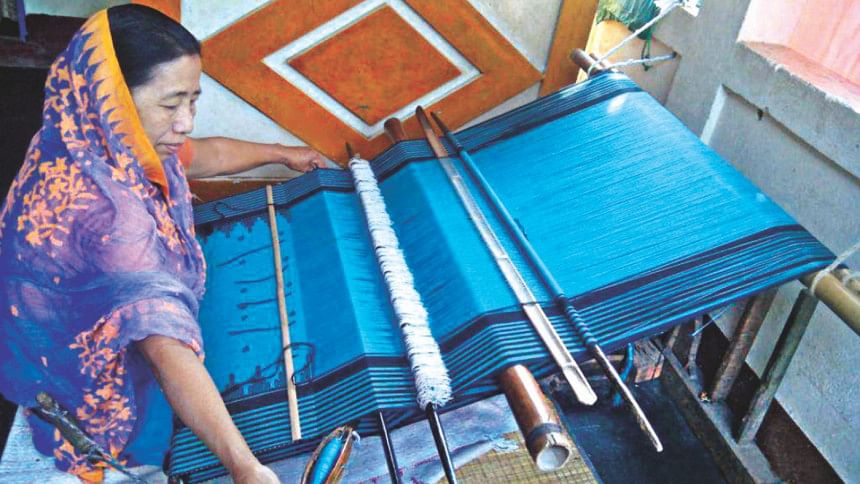More attractive Manipuri saris ahead of Eid

Female workers in Sylhet are busy weaving Manipuri garments and handloom items ahead of Eid-ul-Fitr with the help of Ethnic Community Development Organisation (ECDO).
Bichitra Hamom, 21, a Manipuri weaver of Songaon village in Kamalganj upazila of Moulvibazar said, “At first I was not getting any order as I could not produce the multi- dimensional designs that represent the Manipuri tradition. After receiving training and support from ECDO, I now know how to create the traditional designs and attract customers.”
“Now I am very busy weaving saris as Eid is a few days away and large orders are coming from different parts of Bangladesh and abroad,” she added.
Not only Bichitra, around 1,000 women in Sylhet Division got support and are now passing busy time weaving clothes ahead of Eid.
Lamabazar in Sylhet city and Kamalganj and Srimangal upazilas of traditional Moulvibazar are well known for their Manipuri handlooms, which are very creative and trendy.
Weavers Ruma Devi, Anjali Devi and Helen Sinha of Lamabazar told this correspondent that wholesalers collect the products from the weavers' houses, adding that many tourists also buy their handloom products.
Several weavers said they had started early to cope with the pressure of completing the huge Eid orders. They produce saris, shawls, bed-covers, bed-sheets, women's three-piece clothes and scarves, they added.
A sari costs between Tk 3,500 and Tk 6,500; an orna costs Tk 850 to Tk 1,800; a gamchha costs Tk 850 to Tk 1,700; a shawl costs Tk 1,100 to Tk 2,000; a muffler costs Tk 400 to Tk 600, and a bag costs Tk 650 to Tk 800.
Anjali told this correspondent that ECDO of Sylhet gave them training and all kinds of help for progressing in weaving.
Helen said ECDO helped them to increase their handloom skills and capacity by providing different kinds of training and other technical support, and also by setting up a production and display centre for marketing the products. They also provided funds with support from Oxfam, an international NGO, she added.
Executive Director of ECDO Lakshmikanta Singh told this correspondent, “We found that it is possible to ensure development of Manipuri women by promoting this traditional sector of the indigenous community.”
Chandra Shekhar Saha, a famous fashion designer, gave them training on weaving clothes with multi-dimensional designs that represent their unique tradition, Lakshmikanta said.
Considering the above things, ECDO has taken the initiative to open an outlet with the name of MOIRANG for Manipuri women handloom artists, he added.
Faruq Mahmud Chowdhury, president of Susasoner Jonno Nagorik, Sylhet chapter, said the Manipuri indigenous community has a household production system where women use handloom to weave clothing and sell them in the market.
This handloom industry has been playing a vital role in the Manipuri economy, he added.

 For all latest news, follow The Daily Star's Google News channel.
For all latest news, follow The Daily Star's Google News channel. 



Comments